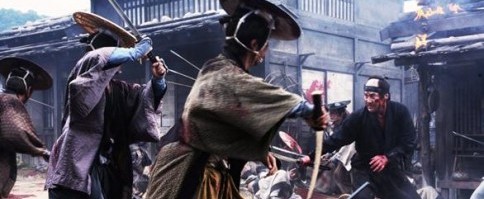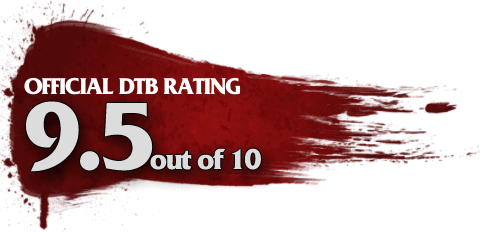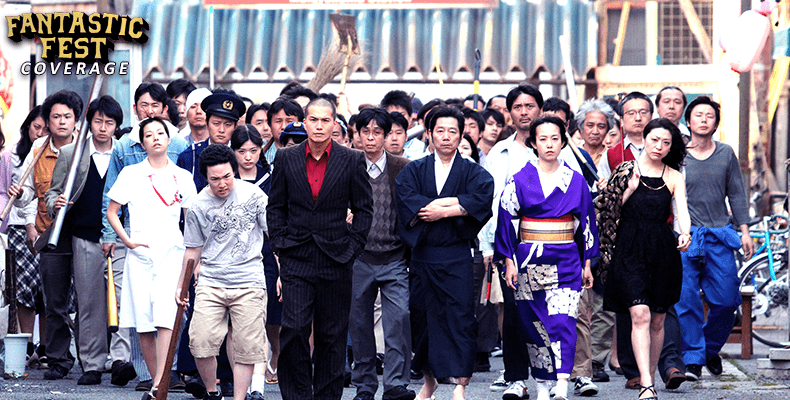Movie Review: ’13 ASSASSINS’
 Takashi Miike may be one of the hardest working directors working in cinema today. In the past ten years, the director has made more than fifty movies and T.V. movies. What is even more bizarre about the Japanese auteur is his choice of films. Eccentric, weird, gross, and unpredictable are just a few words that come to mind when thinking about Miike’s films. Audition, a story about an obsessive relationship gone painfully wrong, was the film that catapulted the director to notoriety in the States. Since then, the director has tackled straight-up “yakuza” films with the Dead or Alive trilogy, the power and danger of the media with Visitor Q, the wacky hijinks of a family in the zombie -musical The Happiness of the Katakuris, the day to day life of a superhero in Zebraman, and what many consider one of the goriest movies ever made … Ichi The Killer. Now, the world-renowned director is making his homage to classic samurai cinema with 13 Assassins. So how does this violent and epic period piece fit into Miike’s film canon?
Takashi Miike may be one of the hardest working directors working in cinema today. In the past ten years, the director has made more than fifty movies and T.V. movies. What is even more bizarre about the Japanese auteur is his choice of films. Eccentric, weird, gross, and unpredictable are just a few words that come to mind when thinking about Miike’s films. Audition, a story about an obsessive relationship gone painfully wrong, was the film that catapulted the director to notoriety in the States. Since then, the director has tackled straight-up “yakuza” films with the Dead or Alive trilogy, the power and danger of the media with Visitor Q, the wacky hijinks of a family in the zombie -musical The Happiness of the Katakuris, the day to day life of a superhero in Zebraman, and what many consider one of the goriest movies ever made … Ichi The Killer. Now, the world-renowned director is making his homage to classic samurai cinema with 13 Assassins. So how does this violent and epic period piece fit into Miike’s film canon?
13 Assassins opens with a moving piece of bloodshed that sets the tone for this more serious and mature piece of filmmaking from the usually more “flashy” director. After a well-respected samurai commits suicide in an act of defiance over the recent rise of power of Lord Naritsugu, a council is gathered by the Shogun leaders to discuss what is to be done. Lord Naritsugu is a ruthless and brutal ruler that is seen as a threat to everyone. The council ultimately decides to hire the experienced samurai Shinzaemon to kill the evil Lord. Shinzaemon then gathers together a small band of veteran samurai and non-experienced young boys, including his immature and womanizing nephew Shinrouko, to help him with his dangerous mission. Their plan includes attacking the Lord as he leaves Edo to return to his kingdom, by way of springing a sneak attack as he travels through a small village.
The resulting film is Takashi Miike’s most sophisticated work to date. Everything from the subtle lighting, to the pitch-perfect sets and costumes come together to create a realistic look into feudal Japan. Aside from an amazing looking film, Miike and screenwriter Daisuke Tengan have crafted a meaningful story that explores the many facets of the samurai culture. Loyalty, honor, respect, and obedience are just a few of the qualities found in the samurai culture that are addressed in subtle but poignant ways. As a result, 13 Assassins is one of the best samurai films ever made and one of the most thoughtful films in Takashi Miike’s career. Coming in as a huge fan of the director, I can assure you, I do not use those two phrases lightly. 13 Assassins is an absolute masterpiece that presents an epic scope to what would typically be a run-of-the–mill story.
For those used to the wet, wild, and bloody films that put this director on the map, you can breathe a sigh of relief. As the first hour and fifteen minutes lead up with much intrigue and anticipation to the eventual attack, it is the final 45 min. that will show off the director’s knack for violence. The film never reaches the outrageous levels of gore that Miike fans know he can attain, but it certainly delivers a long, dirty, bloody, and large-scale finale that is recently one of the best examples of action cinema. The inventive ways he shoots and orchestrates this grand scale final battle would not have mattered if we were not already invested in the great characters. Goro Inagaki creates a monstrous Lord Naritsugu that is every bit a self-centered megalomaniac as a heartless bastard. Thankfully, the superb actors that make up the assassins, make you want to see them all survive in the end and walk away victoriously. Yet, as the swords begin to be drawn, we know that not everyone is going to walk away from this. By the end of the battle, Miike patiently showcases the blood-drenched walls and streets littered with bodies to show what the samurai are willing to do when they firmly believe in the mission at hand. For once, he’s not necessarily focusing on the graphic details in a gleeful like manner. Like some of the young samurai in training, maybe the director has finally seen the meaning of violence.
Takashi Miike has made a successful homage to the films of Akira Kurosawa while also incorporating his own unique voice. The success of the film completely relies on Miike. He handles the many characters and the political subplots with a samurai-like skill, and wraps it all up in an exciting and visceral long battle. Though the film was made in only three months in July 2009 to Sept. 2009, the look and feel of the film is as if it stepped straight out of this dark and violent time period. 13 Assassins is a new cornerstone in the diverse career of this acclaimed director. Don’t let the shocking nature of some of Miike’s previous films speak for what you will expect with this classic and thoughtful piece of Japanese cinema.
 The Tivoli Theatre in St. Louis will be showing 13 Assassins starting May 27, 2011, for ONE WEEK ONLY! Make sure to check it out!
The Tivoli Theatre in St. Louis will be showing 13 Assassins starting May 27, 2011, for ONE WEEK ONLY! Make sure to check it out!



